There is a lot of great television. I don’t watch all of it, because I do love my niche shows.
I just want to make sure it’s very clear that this is just my opinion, and I only picked from shows that started and aired during this decade, which is the only reason my ladies Betty Draper and Bonnie Bennett are not present on this list.
15. Vanessa Ives (Penny Dreadful)
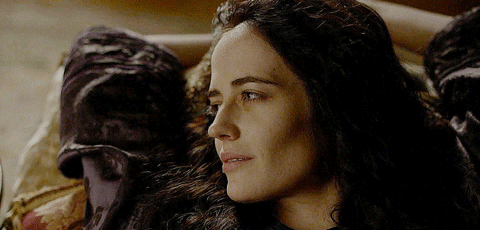
(via Tumblr/Showtime)
We might not have a “Dark Universe” movie franchise (despite Universal’s efforts), but the Showtime series Penny Dreadful delivered a taste of what it could have looked like. But the real draw of the show, for myself and others, was the dark but glorious Vanessa Ives, played by Eva Green.
Introduced in the series as a childhood friend of Dracula’s Mina Harker, the narrative slowly reveals that Vanessa is a powerful medium, whose unique powers and abilities make her a draw to the creatures of the night. Despite the darkness that follows her, she is a Catholic and struggles throughout the series to have her faith be an anchor in the sea of black. Green plays this character to perfection, and despite the ending, I think that Vanessa Ives—a powerful, unique, and complex creature who was killed off in an unsatisfactory way—is very 2010s.
14. Mellie Grant (Scandal)
Oh, Scandal. It may seem strange now, but Scandal changed the landscape of television, and while Kerry Washington’s Olivia Pope is an icon, my favorite character in the series ended up being Mellie Grant, the cold First Lady of the United States. Scandal initially set Mellie up as a villain, but as I grew into my own critical eye, I realized that I did not agree with the narrative’s vision of Mellie.
Why should she be happy that her husband, President Fitzgerald Grant having an affair? Why should she be happy for the passive role she has been forced to play in life? Why isn’t her husband interested in understanding why she has pain instead of vilifying her for it?
Mellie is not a “good” person. She’s selfish, struggles with maternity, and has a childish desire to be first, but she’s a stand-in for a lot of women who have had to be number 2 in troubling circumstances. She is a Nasty Woman in the truest meaning of the words.
13. Stahma Tarr (Defiance)
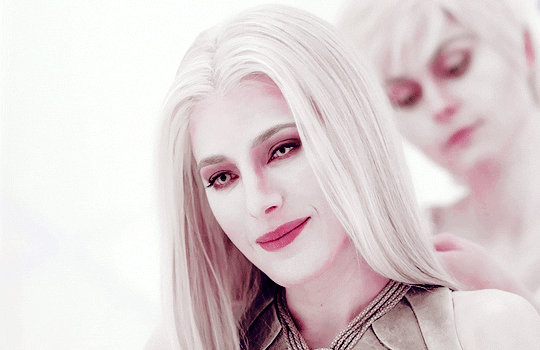
(via Tumblr/SyFy)
Sadly, SyFy’s Defiance only lasted a few seasons, but it was one of my favorite shows. It helped bring me back into science fiction and properly introduced me to Jaime Murray as Stahma Tarr.
Stahma is a fascinating character. A high-ranking alien with strict gender and caste laws, Stahma presents the image of a loyal pure Castithan wife but is an excellent political manipulator capable of great love and cruelty. She was one of the first bisexual/pansexual characters I loved for being ruthless for reasons that had nothing to do with their sexuality and everything to do with their personal ambition.
Stahma was a leader, mother, wife, grandmother, and antagonist seamlessly, and managed to survive the series without losing any of her edges. It was a true pleasure and a reminder to me of the importance of writing good queer villains.
12. Joan Watson (Elementary)
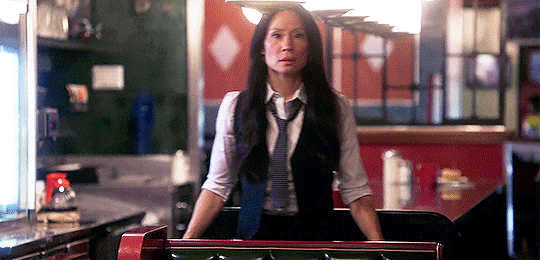
(via Tumblr/CBS)
Elementary slaps. Not only is it one of the best incarnations of a modern-day Sherlock Holmes, but it did a wonderful job of staying true to what made the original series work: procedural crime with strong characters. Johnny Lee Miller was amazing as Sherlock, but who is Sherlock without Watson?
When Lucy Liu was cast in this role, there was a lot of grief given to her about being Chinese woman version of the character. People also assumed that this would be a way for them to have Watson and Holmes be a couple without them being gay. However, not only was Joan one of the most competent and well-rounded versions of Watson out there, the show always maintained a platonic relationship between the two characters, showing that they were best friends who loved and respected each other.
Joan was a detective in her own right, her opinions respected and allowed to contain a multitude of qualities and desires. Plus, Lucy Liu got to wear amazing outfits. It was a fantastic seven-season run for a show that got called a “ripoff” of BBC’s Sherlock.
11. Abbie Mills (Sleepy Hollow)
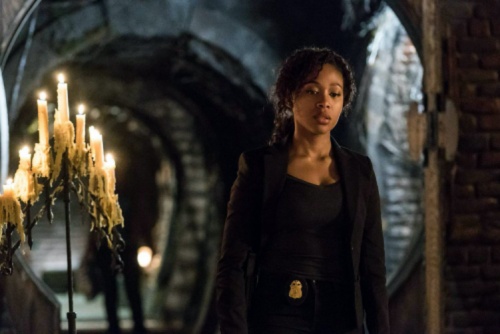
(via Fox)
One of my first posts for The Mary Sue was a piece on the death of Abbie Mills from Fox’s Sleepy Hollow, a moment that still makes me rage. I had such high hopes for Sleepy Hollow. It and Elementary came out at the same time, and both of them were shows that got a lot of loud backlash about having women of color leads.
Abbie was the Scully of Sleepy Hollow, one the two chosen ones tasked with saving the world. Throughout the first season, we got to see her come to terms with personal trauma, while also saving the world from the forces of evil. What’s so disappointing about Abbie’s fate is that she was an original character, not some race bent character. She had all of this potential to be a true lead, but it was wasted by showrunners and a lot of behind-the-scenes crap that proves the series was not as diverse as it appeared to be.
When Abbie appeared on the scene, I and many others thought it was signal of a real change in the depictions of Black women in sci-fi/fantasy. Instead, she became a talking point about how, even when you think you are ahead, it can be brought down at any moment. Her death in season three was the end of the series; I don’t know what the fourth season you’re talking about.
10. Alison Argent (Teen Wolf)
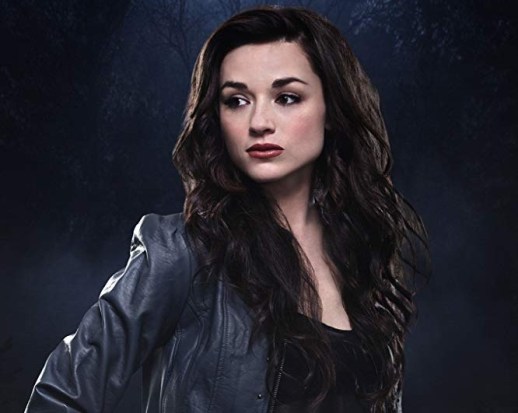
(via MTV)
Oh, sweet Alison. MTV’s Teen Wolf was a show that surprised me. The promotion for it didn’t really excite me, but after seeing it blow up on Tumblr, I quickly decided to binge it. Despite a slow start, I came to love the character of Crystal Reed’s Alison Argent, an archer and part of the Argent family of monster hunters, and love interest to werewolf Scott McCall.
Not only did I love the relationship between Scott and Alison, but I also appreciated the complexity of Alison herself. She wasn’t a perfect ingenue, with her own desires, fears, and character growth. Her character was killed off because Reed saw that her character was kind of getting screwed over, storyline-wise. It was one of the most frustrating moments of my TV experience, and despite loving Kira, it was part of an era of Teen Wolf that really didn’t care about its female or POC supporting characters.
9. Delle Sayah Kendry & Aneela Kin Rit (Killjoys)
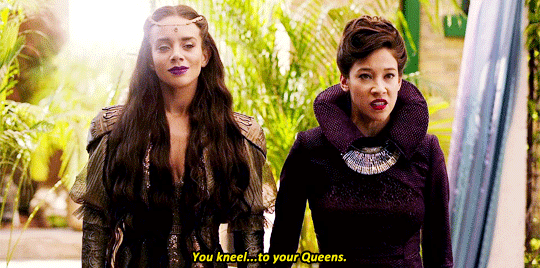
(via Tumblr/SyFy)
So, this one was a double feature, but whatever. It’s my list, and I think when a show gives you a pair of evil space lesbians, you put them together. That’s the rules. Killjoys is probably my favorite show of the decade because it subverted so many expectations of good and evil. Plus, it was filled with amazing characters of color who were also queer people. Two of those are the evil space alien lesbians Delle Sayah Kendry and Aneela Kin Rit.
Without spoiling it, both of these characters are framed as villains, and while they never lose their edge or inclination to murder, both of the women get to grow into “better people” without having to be “good people.” Not to mention, I can’t think of another show that got to be so queer and joyful at the same time in an action, science-fiction setting. Killjoys is the show that really makes me hopeful for the future of what Black and brown women can look like onscreen in that genre.
8. Sansa Stark (Game of Thrones)
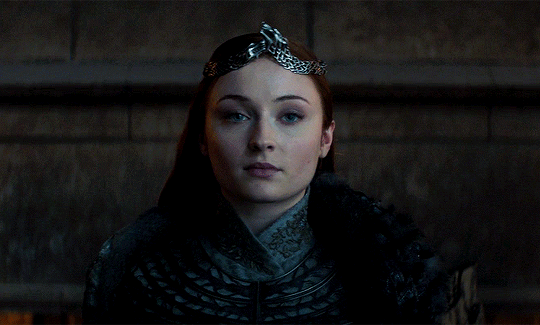
(via Tumblr/HBO)
I mean, if you know me, you knew this was going to happen. I’ve spoken about Sansa—both on HBO’s Game of Thrones and in its source material—a lot on this site, but to summarize, the character of Sansa helped me really come into my feminism. Reading the discourse around the character highlighted the way feminine female characters are unappreciated, even if they’re filled with complexity.
While I feel the show didn’t perfect Sansa (even though Sophie Turner killed it in the roll), it did bring her into my life, and because of that, I will always be grateful. Also, just the idea of the most hated character in the franchise surviving and being allowed to be queen, in the end, is a flex I won’t soon forget.
7. Catra (She-Ra)
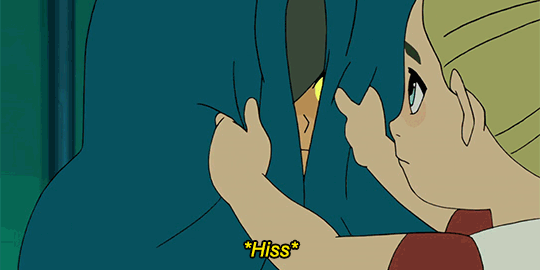
(via Tumblr/Netflix/Dreamworks)
Catra is everything. Netflix’s She-Ra and the Princesses of Power is one of the best shows on television right now—the character building, the writing, and the beautiful animation. While there are so many characters I love on this show, I think the character I connect with the most is Catra, not only because I love her, but also because I see in her the DNA of many other female characters I’ve loved before, like Azula and Demona.
I love that Catra is shown to be a character who has dealt with legitimate trauma, but the narrative never says that because she feels pain, it’s okay for her to hurt other people. There are consequences to her actions, and that’s what makes her possible atonement possible. I love the nuance of Catra, and I’m looking forward to seeing where she goes from here.
6. Fiona Gallagher (Shameless US)
I’ve also written on end about why why I love Fiona Gallagher, so, to sum it up with something I’ve written before:
“She is a character I’ve cried with, loved with, and felt pain with—many times not even just because of the writing, but because of the amazing talent of Emmy Rossum, who killed it every single time. Shameless has always been bounced around from drama to comedy categories because no one seems to know quite how to classify it, but regardless of where you put it, Emmy Rossum’s dramatic performances as Fiona Gallagher deserved all of the awards.
Rarely do we get shows with realistic depictions of poverty from a female perspective—not just the financial struggles, but also the emotional ups and downs of growing up and trying to thrive in a toxic place.”
5. Bo Dennis (Lost Girl)
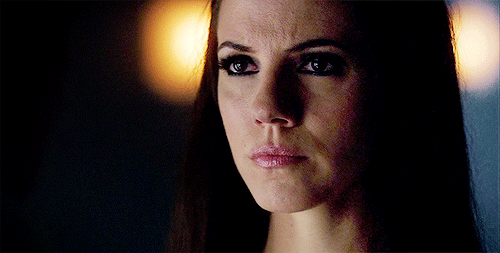
(via Tumblr/Showcase)
Lost Girl is a complicated show. It’s by no means perfect, and I think, after season three, it really sort of struggled with holding its mythology together. That being said, I loved it because it was the first show I watched as a bisexual woman that had a bisexual/pansexual female protagonist—mot supporting, not the sidekick, the lead character.
Bo Dennis, the succubus with a heart of gold, is a character that I identify with more as I get older, in terms of wanting to be a hero and wanting to be loved. I always appreciated that Bo was a person who loved and needed sex, but also wanted real love. So often, bisexuality is presented as pure sex without love, and Bo really broke the mold. She was allowed to be sexual and loving, pure and a succubus, and that alone is something I’ve held close to my heart as I’ve moved forward in life.
I’ll always be grateful for Bo. She was my hero when I needed it.
4. Blanca Evangelista (Pose)
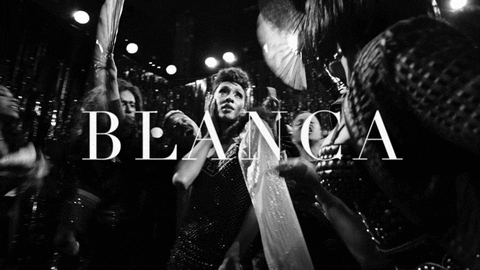
(via Tumblr/FX)
Mj Rodriguez is a star, and the character she plays on Pose, Blanca Evangelista, is one of the most beautiful, kind, strong, empowering women I’ve ever seen onscreen. We’ve watched her take her diagnosis of being HIV positive as a reason to be secure in her sense of love, kindness, and compassion to others. For Blanca, building a world for her children and living a full life, undaunted by the homophobia and transphobia of the world, will be the legacy she passes on.
Her optimism may not always end up being correct, but Blanca goes on for herself and for others. There is no one else like her on television.
3. Regina Mills (Once Upon a Time)
Man, this scene was such a flex. This is when I knew that I had to stan. Regina Mills, as played by the beautiful Lana Parrilla, was the sole reason I kept up with Once Upon a Time once I realized they weren’t going to allow the show to be as gay as it could be. Regina is a messy character. She’s a rapist*, a murderer, and childish. Her desire for revenge is often misplaced, and despite how you may feel about the validity of her trauma against Snow White, the reality is she took it too far.
All that being said, Lana plays the character so perfectly that you can’t help feel sympathy for Regina. While the show waffles on being able to fully deal with Regina having been an evil person, part of the reason I loved her is that she was always the most interesting person in the room. Lana Parilla’s pure swagger as Regina elevated the character to a level that went beyond what was on the page. I wanted Regina to win, regardless of whether she deserved it or not, and even now, I don’t really think the narrative sold me that she did, but it says a lot that, in the end, I didn’t care.
Long Live The Evil Queen.
*The show really was terrible about casual rape, and while the creators say it wasn’t actually rape, it clearly was.
2. Laurel Lance (Arrow)
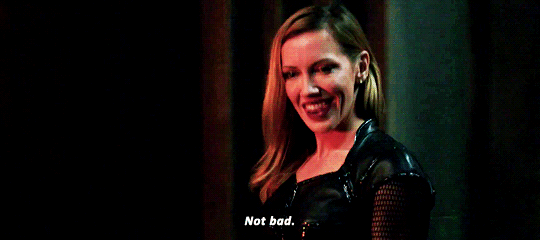
(image via The CW)
I watched Arrow for Laurel Lance. Black Canary is one of my favorite characters of all time, so hearing she was on the show was why I tuned in, because what’s a show about the Green Arrow without his wife? Well, it’s Arrow, apparently.
The issue with Arrow‘s treatment of Laurel was the dismissive and gaslight-y ways things were written. Her grief was weaponized against her, her legitimate anger towards Sara and Oliver’s betrayal was written to make her look crazy, and despite being based on one of the most important female Justice League members ever, the show negged her for even trying. It was infuriating to watch, but I loved Laurel because what I saw was a woman struggling to be heard by a group of people who wouldn’t tell her the truth.
When she was killed off because “there were no more storylines” for her, I was livid. This is why watching the character slowly being brought back to now being fully incorporated into Arrow again has been bittersweet. The writers didn’t know what to do with Laurel—didn’t want to give her power, didn’t want to make her too strong, and then killed her. I may be happy that Earth 2 Laurel is here being a badass, but her death was something I just truly could never forgive the show for.
To reduce the Black Canary for the sake of your male protagonist … you truly hate to see it, folks.
1. Iris West-Allen (The Flash)
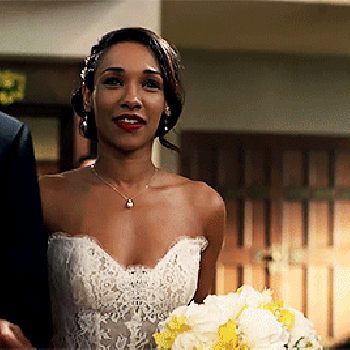
I have written about Candice Patton’s Iris West-Allen on this site so many times it could border on fanatical, but since she’s my number one pick, I think I am going to just put my stan card down for a second and talk about what Iris means to me as a Black woman who loves pop culture, even when it doesn’t love me back.
One of the things that is often heartbreaking about being engaged in fandom is seeing how parts of your identity are often targeted for hate. As a Black woman who loves what I love, there have been so many times I’ve seen the (mostly) token Black women who get to be on a show treated as secondary by both the writers and the fans. I’ve seen women like Angel Coulby (Gwen from Merlin) get called ugly, get blamed for the homophobia/queerbaiting of writers, and get belittled by fandom.
Merlin was especially hard because, in the final season, when Arthur and Gwen were actually married, the couple did not kiss once the entire length of season five. It truly felt like a slap in the face because, while I get why Merther fans were disappointed, why did that mean that an actual canon interracial couple needed to be sidelined? That, as well as multiple other shows, is why I was so nervous about Iris West.
Candice is gorgeous, and yet, I would see people say she wasn’t good enough, that they had no chemistry, and ship Barry with literally every other woman who blinked in his direction. Considering what happened to Laurel, I didn’t feel safe thinking that Barry and Iris would last just because they are comic couple royalty. So, that’s why watching The Flash‘s sixth season and seeing that Iris is actually getting more to do, and that the relationship between Iris and Barry has remained a core aspect of them, is so meaningful to me. It could have easily not happened.
Iris West-Allen is not expendable, and that matters to me at 27. It matters to the 7-year-old version of myself. Tt matters to the 17-year-old version of myself. It matters to me that Iris is here and important and so utterly loved by her husband onscreen, because that is something Black women need to see—that Black teens and girls need to see.
Iris West-Allen matters. Period.
What characters were your guiding lights this decade?
(image: The CW, Showcase, ABC)
Want more stories like this? Become a subscriber and support the site!
—The Mary Sue has a strict comment policy that forbids, but is not limited to, personal insults toward anyone, hate speech, and trolling.—



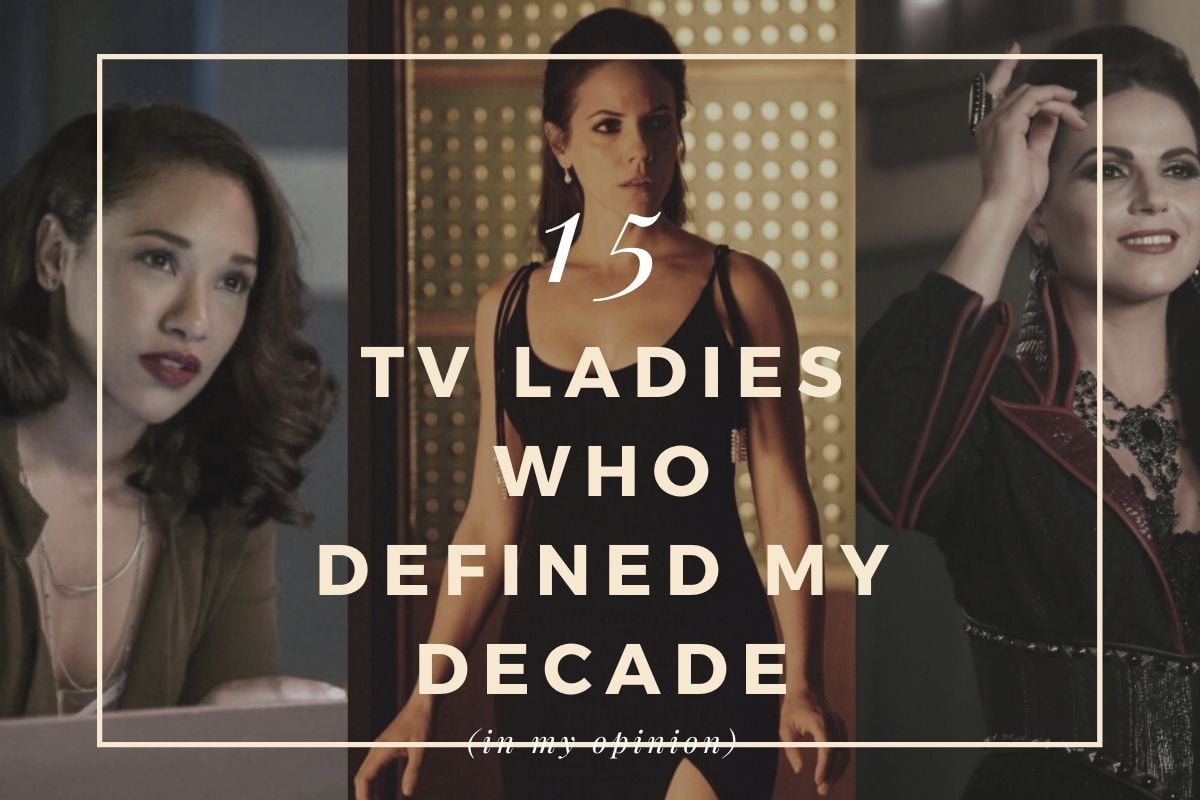






Published: Dec 24, 2019 12:00 pm